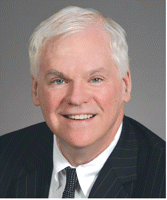Let's Get the SGR Formula Fixed

During the recent lame-duck session of Congress, the proposed cuts in Medicare payments of roughly 25 percent were delayed for a year. The trade-off was that new payment and delivery models would be developed to replace the current SGR system. SGR stands for "sustainable growth rate." It was developed in 1997 as a way to control health care costs while accounting for inflation and changes in the volume of care. The problem with the sustainable growth rate model turns out to be … it's not sustainable. For each year beginning in 2002, the SGR formula has called for a substantial reduction in Medicare physician payment rates. For 2002, payment rates were reduced by 5.4 percent. This caused great opposition, and in each subsequent year, Congress has overridden the formula, specifying small increases or payment freezes instead of large cuts. Unfortunately, these cuts have not been rescinded but have been added to the bill for future cuts, thus leading to the proposed cut of about 25 percent for 2011.
SGR-driven cuts are a particular problem for psychiatrists for two main reasons. First, the payment system of which it is a part (the resource-based relative value scale, or RBRVS) has historically undercompensated cognitive specialties, including psychiatry. Second, Medicare assumes that physicians respond to payment cuts by increasing the volume and/or intensity of their services, something that is all but impossible for psychiatrists to do. SGR-driven cuts thus are particularly onerous for APA members.
So, just about everyone agrees that we need a new model or models of how to pay for Medicare services (which, of course, will have influence on all insurance). The president's budget calls for an additional two years of reprieve on cuts to stabilize Medicare, during which time new models of payment can be piloted and assessed. Many organizations have been developing proposals for new payment mechanisms and include the Centers for Medicare and Medicaid Services, MedPAC, the Institute of Medicine, Robert Wood Johnson Foundation, Brookings Institution, American Hospital Association, as well as academics, private insurers, and large employers.
Last year, the AMA convened a new SGR Task Force to provide physician input and leadership into the discussions in Congress about Medicare payment. Representatives of key specialty societies such as those in internal medicine, family medicine, surgery, cardiology, anesthesiology, and psychiatry, as well as various state medical societies including those of California, Texas, Massachusetts, Ohio, and Wisconsin, came together at the AMA offices in Washington, D.C., under the leadership of Ardis Hoven, M.D., the chair of the AMA Board of Trustees, to discuss the issues and whether it is possible to present a united front so that physicians have a single, strong voice under resolute leadership as decisions are being made about Medicare payment. Gene Cassel and Nick Meyers from our Division of Advocacy and I have represented APA. Patrice Harris, M.D., an APA member who chairs the AMA's Council on Legislation, has also attended.
Any new payment system that controls costs will require some painful choices, and some specialties will have to change more than others. Much has been made of new approaches such as medical homes and accountable care organizations, but how these will be paid for and where the money will come from have yet to be specified. Will procedural specialties "lose" and primary care specialties "win" in any new payment system? And will medicine split apart along these lines? The consequences of a divided house of medicine will be that physicians won't have much of a voice in the decisions.
To help face this challenge, the task force is establishing a steering committee with significant physician expertise to help evaluate and design new payment and delivery models. Communication with all stakeholders will be critical. We will continue our participation in the task force to ensure that psychiatry's concerns are addressed.



